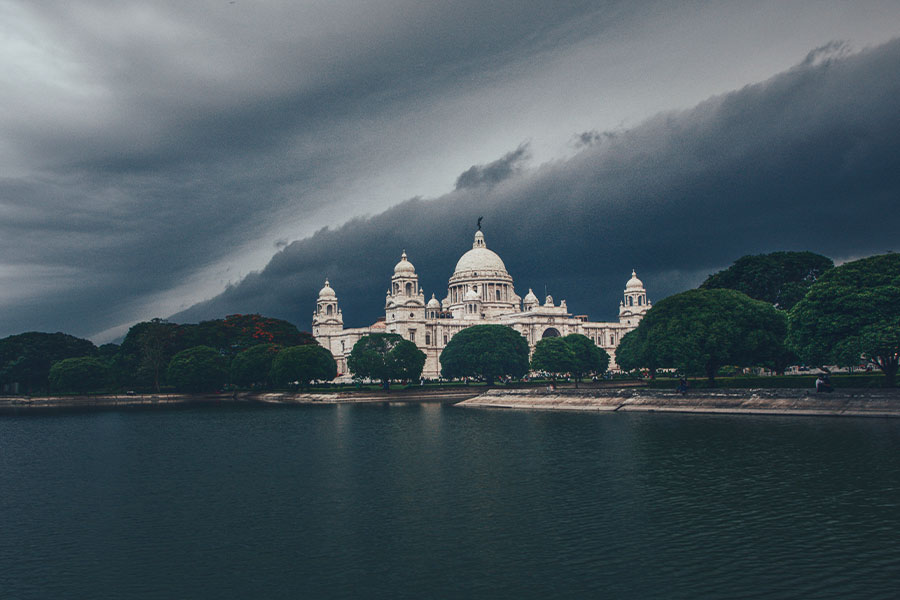There was a song that Bing Crosby used to belt out from the old gramophone my dad owned. It went like this:
Those April showers, they come your way
They bring the flowers that bloom in May
So if it’s raining have no regrets
‘Cause it isn’t raining rain, you know, it’s raining violets!
Bing Crosby warbles on through the song about clouds, hills, bluebirds and daffodils, and all the benefits of those showers, but I get back to thinking about the Kalbaisakhi and how it affects my life.
A couple of weeks ago, after ages, my internet connection started ‘flapping’ – that’s the official term, I kid you not. It came, it went, it came again and as I logged into my online conference, it went again. Fortunately we have been schooled in the art of backup and jugaad, so the limited ‘gigs’ – another term, gigabytes in translation – on my phone were pressed into service through the hotspot and the conference went on sans video, the bandwidth chewing gizmo on all devices with cameras. Now that I have all the techie terms out of the way, it’s back to giving you my seasonal views.
Not just Spider-man
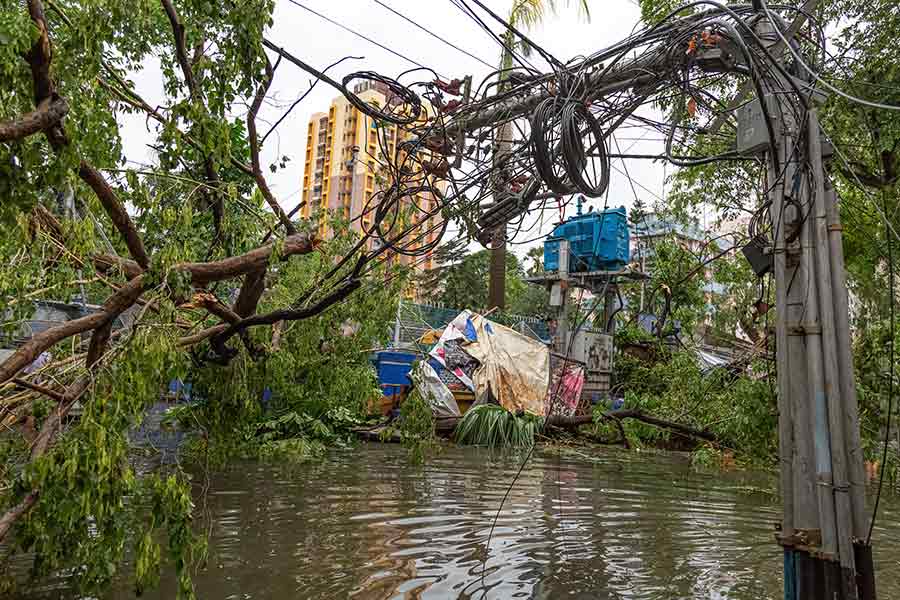
Can you find the wire that goes to your house? Shutterstock
The internet was out. A kalbaisakhi had happened a few days ago. So, I called Babi-da, a gentleman half my age who runs the ISP (that’s Internet Service Provider, though “service” could sometimes be misleading). I mention Babi-da’s age because the suffix ‘da’ means ‘big brother’ – a term you must use along with other verb forms if you want to get anything done within a radius of a few hundred kilometres from Kolkata. Further north, of course, ‘da’ is replaced by ‘daju’ — mentioned as a favour to intrepid travellers approaching the north Bengal exodus season. Young Babi-da is one of the most polite people you could hear from. Contrary to the kalbaisakhi explanation I expected, he explained that certain fires which were lit during Holi had damaged the overhead fibre optic lines and that the comings and goings of the net depended on the balmy breezes that blew through the trees. Or was it due to his overworked and underpaid Spider-man, the lineman who actually flies through the network of poles and wires to ensure the web is up and running? He assured me that, like the Terminator, the net would “be back”. I do hope you were able to read between the lines of what I just narrated, literally the cable network, fibre-optic and electrical lines that draw their ugly fingers across the city, but provide us access to the rest of the world.
Dark web

Load sheddings and power cuts — still common during storms TT Archives
So, what has this to do with kalbaisakhi, I hear you cry. In my youth, dear readers, we experienced a very common phenomenon called “load shedding” – a local term for power outage. Early evening football matches were cancelled in favour of rushing home and taking advantage of natural light for as long as we could. Because the blanket of darkness would descend on us soon. At an unknown hour the power would go off in the neighbourhood. Sometimes it was due to the storm and most often due to the electricity company. The better equipped had pollution spewing generators or silent battery-operated inverters to help them through a few hours. For the rest of us, sweltering heat, compounded by candles and mosquitoes, did nothing to alleviate the pain of having to study for impending examinations come hell or high water.
Hell and high water
Hell was already there in heat and misery, and high water was to follow soon enough. Darkened rooms lit by candles and ‘lontons’ or hurricane lanterns in other languages, did nothing to dispel the delight of an approaching storm. The first gust of air would have various people in the family in heated arguments – heated because of the power cuts, of course. One group opined that windows should be firmly shut against the dust storm. The other group steadfastly promoted the approach of cooling breeze to counteract the heat. Eventually the “closers” won when the rain started. Fat, oozy drops plopping onto the window sill made one hastily shut the opening before the breeze slammed it shut, and open, and shut, and open – flapping like my internet connection.
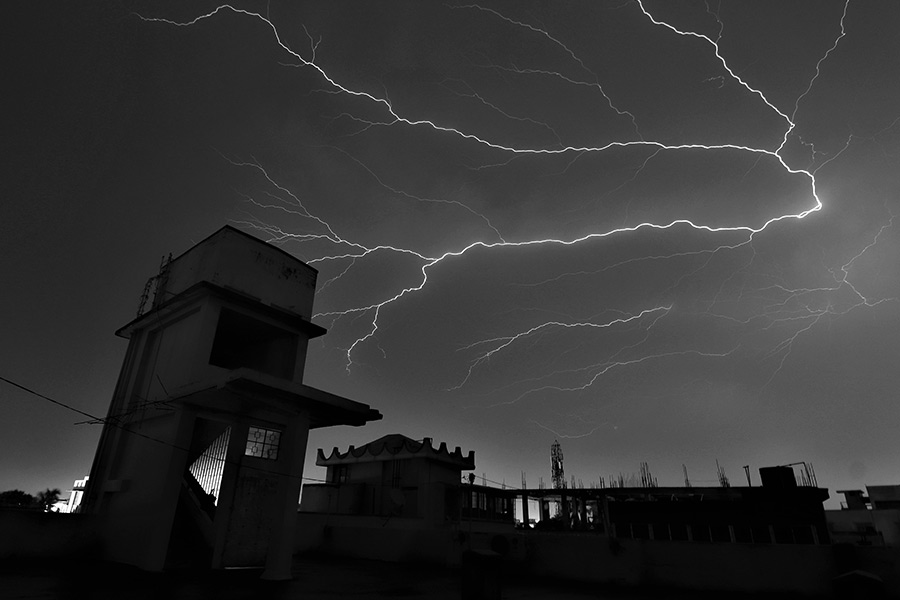
Net connections would instantly be shut down by the ISP for fear of ‘being struck by lightning’, a very real fear Shutterstock
The net connection would instantly be shut down by the ISP for fear of “being struck by lightning”, a very real fear. But of course, electricity had to be restored before anything could work. But not Gran’s Fan, that well crafted spread of dried palm leaves, knitted together on a firm handle that could be used on errant bottoms when needed. With everyone fanning furiously, the wind howling outside, the rain coming down in buckets, no electricity, no entertainment and no network, the family network was all that was left. Discussions, arguments, opinions floated around, till…
Notice your feet getting wet? And your slippers floating around like your opinions? Bucket brigade to the rescue! Mops, swabs, and pochas that once were prized T-shirts are all pressed into service transferring seeping water from the floor to the bucket. Other buckets might be doing a bit of service under dripping roofs. The delight of having bay windows from floor to ceiling suddenly assumes threat status if you are on the coveted 10th floor where the winds don’t blow, they howl. And then the rain stops!
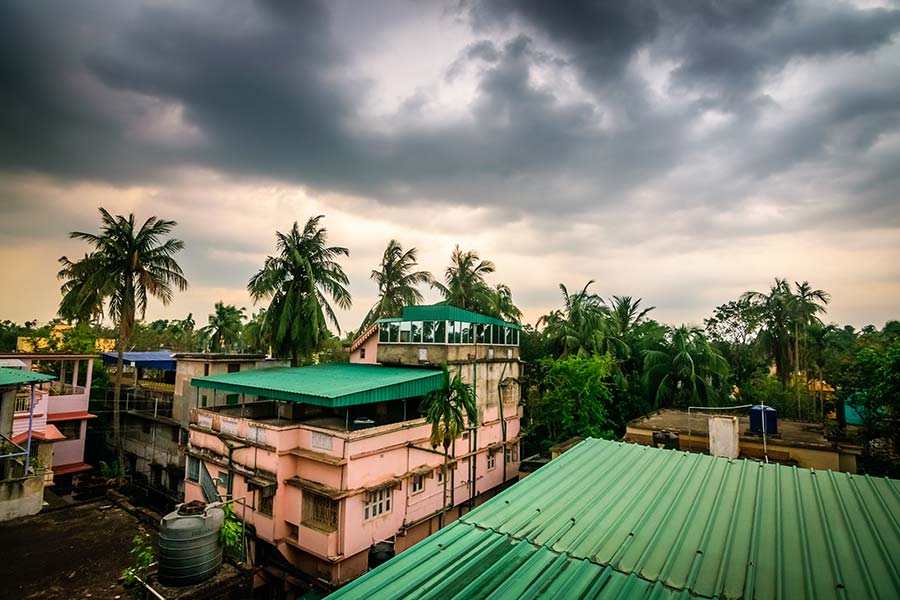
On the higher floors, the winds don’t blow, they howl Shutterstock
Flotsam and Jetsam
“And where you see clouds upon the hill
You’ll soon be seeing crowds of daffodils”
…. continues old Bing in the song. But that’s for Wordsworth and the poets. For us, it’s gumboots, hand-rickshaws and floating garbage on inundated streets. Like other e-devices, E-Rickshaws go suspiciously quiet, the lull after the storm. Silted drains, a salted administration result in flooded streets, blocked drains and in my pond-adjoining area, fish! In our younger days we made paper boats and floated them down the street rivers. Today young kids come with nets to catch the fish who stray too far from the pukur – the local waterbody. We continue to curse the government who apparently are responsible for us throwing the plastic bags that block the drains that create the floods. We smirk at stalled vehicles in which drivers keep the self-starter ‘whinnying’ in the hope that horsepower will prevail. We yell at desperate vehicles trying to plough through the water, creating waves in their effort to get to dry land. Those waves, in their turn, result in a voyeur’s dream come true as aunties raise their saris above the knee, not to mention lungis and pyjamas being rolled up as far as they can go.
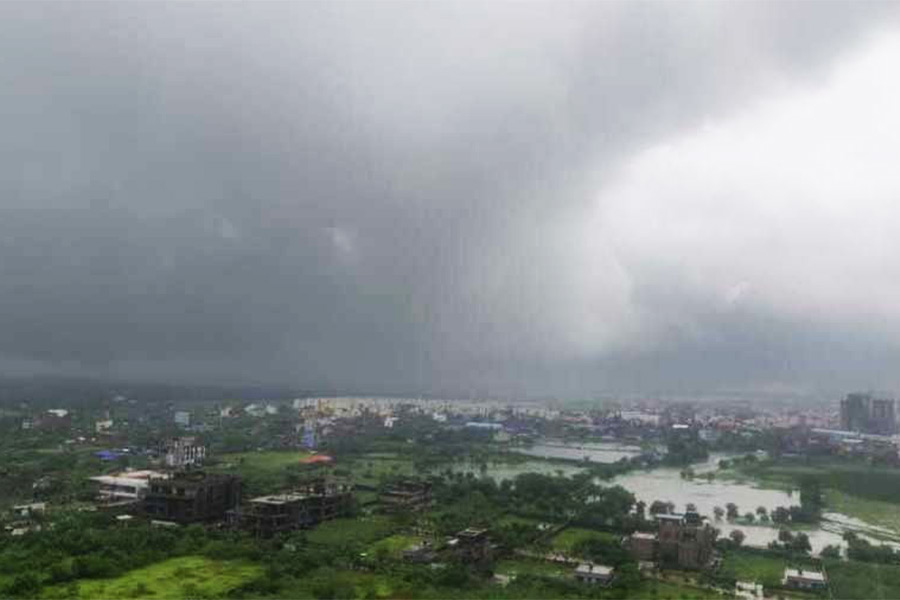
A storm over the East Kolkata Wetlands TT Archives
We wade along confidently till we step into a crater that was left by some other digging agency last week. As we plunge to the waist, desperately holding mobile phones and wallets aloft, we understand the love-hate relationship we have with our local April showers, never mind the blooming flowers!
Leslie D’Gama, a Goan living in Kolkata, is a learning and development consultant, musician and educator. He has survived the storms of life in Kolkata for six decades, from the loadshedding era to the post-Covid era.
